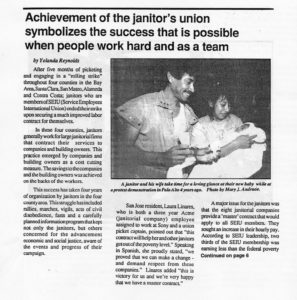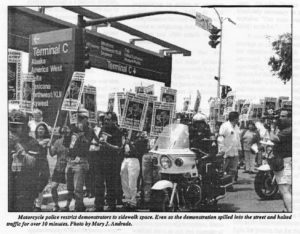July 10, 1996
By Yolanda Reynolds
Photos by Mary J. Andrade

After five months of picketing and engaging in a “rolling strike” throughout four counties in the Bay Area, Santa Clara, San Mateo, Alameda and Contra Costa; janitors who are members of SEIU (Service Employees International Union) ended their strike upon securing a much improved labor contract for themselves.
In these four counties, janitors generally work for large janitorial firms that contract their services to companies and building owners. This practice emerged by companies and building owners as a cost cutting measure. The savings to the companies and the building owners was achieved on the backs of the workers.
This success has taken four years of organization by janitors in the four-county area. This struggle has included rallies, marches, vigils acts of civil disobedience, fasts and a carefully planned information program that kept not only the janitors, but others concerned for the advancement economic and social justice, aware of the events and progress of their campaign.
San Jose resident, Luna Linares, who is both a three-year Acme (janitorial company) employee assigned to work at Sony and a union picket captain, pointed out that “this contract will help her and other janitors get out of the poverty level.” Speaking in Spanish, she proudly stated, “we proved that we can make a change – and demand respect from these companies.” Linares added “this is victory for us and we’re very happy that we have a master contract.”
A major issue for the janitors was that the eight janitorial companies provide a ‘master’ contract that would apply to all SEIU members. They sought an increase in their hourly pay. According to SEIU leadership, two thirds of the SEIU membership was earning less than the federal poverty level wage of $7.28 per hour for a family of four.
Wage increases in tire new contract average a 4 percent increase, with those at the lowest hourly rate to receive a 5.5 percent increase. In San Mateo and Contra Costa counties, it was reported that the typical janitor earned between $6.27 – $6.45 per hour and generally was not awarded health benefits. A few did have benefits, but they had to be a company employee for five years to be eligible.
Family health coverage was also an issue. Until this new contract was agreed to, 2 of 5 janitors did not have health insurance for their families.
SEIU represents 5,000 janitors in the Bay Area.
Janitor Lorenzo Cabrera explained. we had to fight hard (to get these concessions). He added, “janitorial work is a demanding physical job and complicated by the night hours we must work.”
The janitorial workforce in this four-county area is made up mostly of people of color, often Latino and more likely than not are relatively recent immigrants to California, if not the United States. SEIU 1877 President Mike Garcia explained that approximately 40% of the janitors were formerly seasonal field workers. For them, each step they have made is a major improvement economically and socially for themselves and their families. In spite of the years of work and successes of the UFW field workers are still among the most exploited workers in the United States labor force.

For those who had previously been field workers, working as janitors provides them with year-round employment. Many of these workers had already learned the value of labor organizing in order to counter employers that balk at fair compensation for hard work and who persist in subjecting their workers to arbitrary and often unsafe working conditions.
Garcia explains that this agreement with the major contracting firms represents hope for many workers. Garcia says, “It was not just a boost for janitors but (it is) a boost to all workers in subcontract industries”
Contracting and subcontracting is becoming the norm in many sectors of the workforce. Already some companies contract out all secretarial services. With few exceptions, court reporters work for contractors who require the reporters, mostly women, to provide their own costly computer equipment that is needed for their work. Furthermore, these contract employees do not receive health benefits, vacation time or sick leave. Their assignments often entail travel to distant sites, thus requiring the reporters to provide their own transportation and adding to an enormous personal job expense. These workers serve as just one example of today’s workers who are subsidizing many of the very powerful and successful companies, who have found new ways to increase their profits at the expense of the worker.
Maria Elena Novarro, another picket captain in the recent janitor’s strike explained that “the first day was scary but that afterwards it became easy.” Garcia explained that the achievements of the janitor’s union symbolizes the success that is possible when people work hard and work as a team. He adds, “in this case it was absolutely necessary to strike.” He explains, “Our main weapon is our ability to strike.”
It takes enormous discipline and courage to participate when strikers are threatened by such actions as occurred in Pleasanton where, reportedly, a police officer asked strikers for their green cards in order to report them to the I.N.S. (Immigration and Naturalization Service). State law prevents police from making such demands unless a person is under arrest on drug possession or felony charges.
Under Federal law a labor strike is an expression of “free speech,” a fundamental right guaranteed by the US Constitution. Union officials credit this right of free speech as a crucial element in their struggle to bring their plight to the attention of the general public and to the shame of greedy or thoughtless employers.
Famed labor organizer Cesar Chavez always encouraged the field workers with the words “Si Se Puede.” Today that expression is heard, not only as the field workers continue their fight for justice, but for many others who seek justice and dignity whether it is for better educational instruction for all, responsible political and community leadership, better working conditions, environmental protection and justice or an end to police abuse, among many other serious issues that affect people’s lives. © La Oferta Newspaper.
